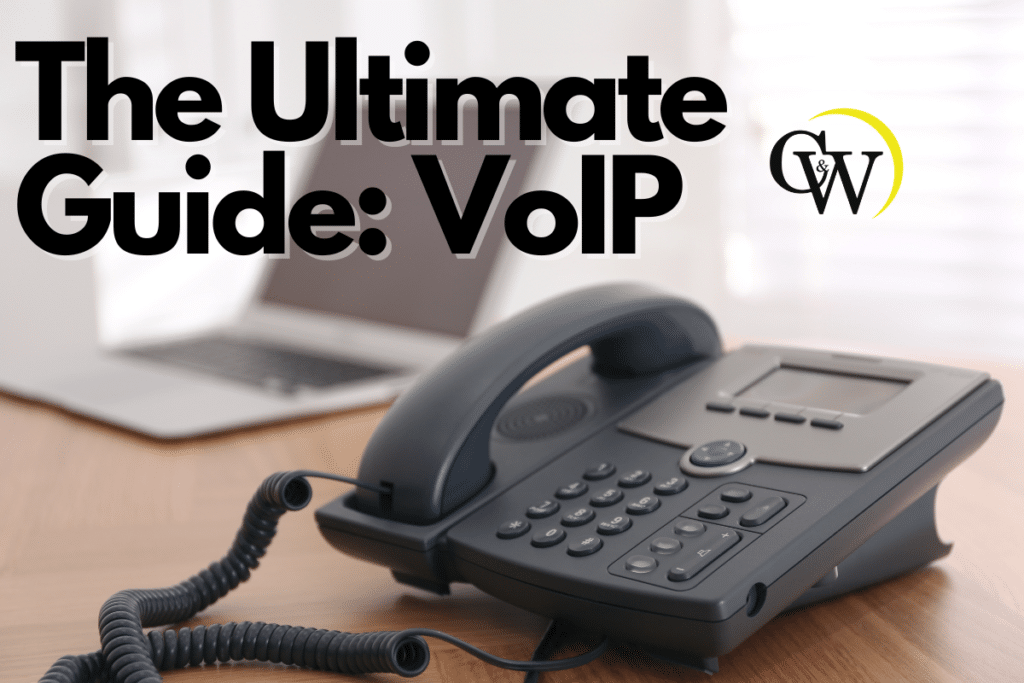Transforming Communication: The Ultimate Guide to VOIP Phone Service for Businesses!

Transforming Communication: The Ultimate Guide to VOIP Phone Service for Businesses!
Communication is an essential aspect of any business, and with the advancement in technology, traditional phone systems are no longer sufficient. Voice over Internet Protocol (VoIP) phone service has emerged as a more reliable, affordable, and feature-rich alternative to traditional phone systems.
In this guide, we will explore VoIP phone service for businesses in detail. We will discuss its benefits, how it works, and things to consider before implementing it in your business. So, let’s get started!
What is VoIP Phone Service?
VoIP phone service is a communication technology that allows you to make and receive calls over the internet instead of using traditional telephone lines. It uses your existing internet connection to transmit voice data in the form of digital packets, making it more efficient and cost-effective compared to traditional phone systems.
VoIP offers various features such as call forwarding, voicemail, virtual numbers, and video conferencing that enhance communication within a business. It also integrates with other business tools such as customer relationship management (CRM) software, making it a valuable asset for businesses.
Benefits of VoIP Phone Service for Businesses
VoIP phone service offers numerous advantages over traditional phone systems, making it a popular choice among businesses.
Cost-Effective
One of the most significant benefits of VoIP is its cost-effectiveness. Since it uses the internet for making and receiving calls, businesses can save a significant amount of money on long-distance and international calls.
Scalability
VoIP phone service is highly scalable, which means it can easily accommodate the changing needs of your business. Whether you are expanding or downsizing, VoIP allows you to add or remove phone lines without any hassle.
Flexibility and Mobility
With VoIP, businesses are not tied to a physical location. Employees can make and receive calls from anywhere with an internet connection, making it ideal for remote and mobile workers. This also allows for more flexibility in the workplace, as employees can easily work from home or on-the-go without missing important calls.
Advanced Features
VoIP phone service offers a wide range of advanced features that are not available with traditional phone systems. These include voicemail to email, call forwarding, virtual extensions, auto-attendant, and more. These features can enhance productivity and improve overall communication within the business.
Reliability
VoIP is known for its reliability, as it uses multiple data centers to ensure uninterrupted communication even in case of a power outage or internet disruption. This feature is crucial for businesses that rely heavily on communication to function.
How VoIP Phone Service Works
The technology behind VoIP is quite simple. Instead of using traditional phone lines, VoIP uses the internet to transmit voice signals in digital form. These signals are then converted into analog signals at the receiving end, allowing for clear and reliable communication.
To use VoIP phone service, you will need a high-speed internet connection, a VoIP phone or adapter, and a subscription plan from a VoIP service provider. Some providers also offer mobile applications that allow you to use your smartphone as a VoIP phone.
Things to Consider Before Implementing VoIP Phone Service in Your Business
Before switching to VoIP phone service, there are a few things businesses should consider ensuring the transition is successful.
Internet Quality:
- As VoIP relies on the internet, it is crucial to have a stable and high-quality connection to ensure clear communication.
Network Security:
- With VoIP, sensitive information is transmitted over the internet. Businesses should make sure to have proper network security measures in place to protect against cyber threats.
Compatibility:
- Before implementing VoIP, businesses should check if their current systems are compatible with VoIP technology. This includes phone models, internet service providers, and network infrastructure.
Training:
- It is essential to provide proper training to employees on how to use the VoIP system efficiently. This can help minimize any disruptions during the transition.
Cost:
- While VoIP is known for its cost-effectiveness, businesses should consider the upfront costs of implementing VoIP, such as purchasing new hardware or equipment.

Local IT Partner: Better Services for Stuart Businesses

IT Services – Scaling Your Stuart Business Strategically and Paving the Way for Growth

Small Business IT Support – Why Proactive IT Support is a Game Changer for Stuart’s Small Businesses

IT Support Stuart FL – When Is It Time to Outsource Your IT?

4 Compelling Reasons to Utilize Managed IT Services in Florida for Your Business Growth

40 Years of C&W: Our Story, Our People, Our Future as an Experienced IT Company
Hello world!

IT Helpdesk for Small to Medium Sized Businesses

8 Common IT Problems Solved by Managed IT Services

Benefits of Proactive IT: Boost Your Business Efficiency

Achieving IT Scalability in 2025

Overwhelmed by the Number of IT Vendors? Tech Overload Frustrations
What is VoIP phone system for small business?
VoIP business phone systems for small businesses are specialized communication solutions designed to cater to the needs of smaller businesses. They offer all the features and benefits of VoIP, but with a lower cost and more flexible options. These systems are ideal for businesses that have fewer employees and do not require extensive call management features.
Some things to consider when choosing a VoIP phone system for your small business include cost, scalability, features, and customer support. It is essential to research and compare different providers to find the best fit for your business.
What is the best phone system for small business?
While there is no one-size-fits-all answer to this question, VoIP phone service has become the preferred choice for small businesses. Its cost-effectiveness, scalability, and advanced features make it a valuable asset for any business looking to improve their communication system.
However, it is essential to carefully assess your business’s needs and consider factors such as budget, internet quality, and compatibility before deciding on the best phone system for your business.
How to choose a business phone system?
When choosing a business phone system, businesses should consider their specific needs and requirements. Here are some factors to keep in mind:
Features
- Consider what features your business needs, such as call forwarding, voicemail to email, and auto-attendant.
Scalability
- Make sure the phone system can accommodate your business’s growth and changing needs.
Cost
- Compare the costs of different phone systems, including hardware, subscription plans, and maintenance fees.
Integration
- If your business uses other tools such as CRM software, make sure the phone system integrates with them seamlessly.
Support
- Choose a provider that offers reliable customer support to ensure smooth operations.
Unleashing Next-Level Communication with C&W Technologies’ VOIP Phone Service
At C&W Technologies, we understand the importance of efficient communication for businesses. That’s why we offer top-of-the-line VoIP business phone service solutions that can take your communication to the next level.
Our VoIP phone service offers all the features mentioned above and more, ensuring seamless and reliable communication within your organization. With our affordable plans and excellent customer support, you can experience cost-effective, scalable, and advanced communication with C&W Technologies’ VoIP phone service. Contact us today to learn more!
As technology continues to evolve, so does the way businesses communicate. VoIP phone service has emerged as a game-changer in the world of communication for businesses. Its cost-effectiveness, scalability, flexibility, advanced features, and reliability make it a valuable tool for any business looking to improve their communication.
By considering the factors mentioned above and choosing a reliable service provider like C&W Technologies, businesses can unleash next-level communication and stay ahead in today’s competitive market. So why wait? Make sure to check our other services that match your needs and make the switch to VoIP phone service today!
Future of VoIP Phone Service
As technology continues to advance, the future of VoIP phone service looks promising. With the rise of remote work and mobile communications, businesses are increasingly turning towards VoIP as their primary means of communication.
Moreover, with the integration of artificial intelligence and other innovative technologies, we can expect to see even more advanced features and capabilities in VoIP phone service. This will not only improve communication but also streamline business processes and increase productivity.
With its multitude of benefits, it’s safe to say that VoIP phone service is here to stay and will continue to revolutionize the way businesses communicate in the future. So why not make the switch today and experience all that VoIP has to offer for your business?
Contact C&W Technologies to learn more about our VoIP phone service solutions and how we can help take your communication to the next level. The future of communication is here, and it’s in the form of VoIP phone service!
Frequently Asked Questions (FAQs)
Q: How do I improve security on my phone calls?
A: To enhance the security of your phone calls, especially when using VoIP, utilize encryption services offered by your provider, avoid public Wi-Fi for sensitive calls, regularly update your app or software, and use strong, unique passwords for your accounts.
Q: How does VoIP fit into a business phone system?
A: Voice over Internet Protocol (VoIP) is a technology that allows phone calls to be made over the internet instead of traditional telephone lines. In business phone systems, VoIP can significantly reduce costs, increase flexibility, and offer advanced features such as voicemail to email, call forwarding, and virtual meetings.
Q: Can I use a VoIP phone system while traveling?
A: Yes, one major advantage of a VoIP system is its portability. You can make and receive calls from anywhere with an internet connection by logging into your VoIP account, making it ideal for business travelers and remote workers.
Q: How do I choose the right VoIP phone provider?
A: Choosing the right VoIP provider depends on several factors including cost, reliability, customer service, the features offered, and how well it integrates with your existing business tools. It’s also important to consider the provider’s reputation and read reviews from current users.
Q: Can I use a traditional desk phone with a VoIP system?
A: Yes, traditional analog desk phones can be used with a VoIP system if they are connected through an Analog Telephone Adapter (ATA). This adapter converts the analog signal from the phone into digital data that can travel over the internet.
Q: How secure is VoIP telephone service?
A: VoIP services implement various security measures including encryption, secure voice protocols, and authentication. However, like any internet-based service, it’s important to follow best practices for internet security to protect against potential cyber threats.
Q: What are the key features to look for in a small business phone system?
A: Key features might include call forwarding, caller ID, voicemail, conference calling, call waiting, auto-attendant (an automated receptionist), and mobile apps for remote access. Advanced systems may offer CRM integration, call recording, and analytics.
Q: Can I use a business phone app on multiple devices?
A: Yes, most business phone apps support multi-device use, allowing you to access your business phone system from your smartphone, tablet, or even your computer, seamlessly switching between devices as needed.
Q: How does using VoIP on a mobile device affect data usage?
A: Using VoIP on a mobile device consumes data. The amount of data used per minute of calling can vary based on the codec (audio compression format) used by the VoIP service but generally ranges from about 0.5 MB to 1 MB per minute. Keep this in mind if you’re relying on a cellular data connection with a limited data plan.
Q: What is a small business phone system?
A: A small business phone system is a telecommunications solution designed to handle the specific calling, messaging, and communication needs of small businesses. It enables efficient management of inbound and outbound calls, offers voicemail services, and often includes additional features like call forwarding, conference calling, and IVR (Interactive Voice Response) systems.
Q: What does unlimited calling mean in VoIP services?
A: In the context of VoIP (Voice over Internet Protocol) services, unlimited calling typically refers to the ability to make as many calls as you want to specified regions, such as within your country or internationally, for a flat monthly rate, without incurring additional per-minute charges.
Q: Are VoIP services secure for business communications?
A: VoIP services implement various security measures such as encryption, secure voice protocols, and network security to protect your communications. However, as with any technology that uses the internet, it’s vital to follow best practices in cybersecurity to safeguard your data further.
Q: Can I use VoIP services on cell phones?
A: Most modern smartphones are compatible with VoIP services, as long as you can download and install the necessary apps from the App Store (iOS) or Google Play Store (Android). However, the functionality might be limited on older models or basic cell phones that don’t support app installation.
Q: How do VoIP phones differ from traditional phones?
A: The primary difference is in how the call is transmitted. Traditional phones use the Public Switched Telephone Network (PSTN) to make calls, while VoIP phones use the internet. This results in VoIP phones often having lower call costs, especially for long-distance and international calls, and the ability to integrate with various software applications.



